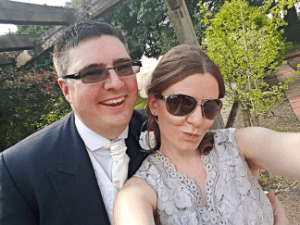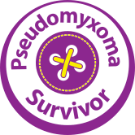In September 2020, we received the terrible news that no one wants to ever hear, my wife Nadine was diagnosed with pseudomyxoma peritonei (PMP). Our world changed immediately with Nadine’s world promptly fell apart and my only memory from that moment was grabbing Nadine’s hand and squeezing it hard.
I had not been a stranger to near death experiences in my family with my Mum being unwell with heart disease and cancer in the past and I have always been the pragmatic one in our family. My mind switched immediately to how do we fix this because in my world I don’t believe in finality and I see the positive in everything that I possibly can.
Telling our daughter has been the only time I have cried during this whole ordeal so far as breaking our 8-year-old’s heart was just too much to take. With the support from the family support team from Nightingale House hospice where Nadine works, we were advised to be honest with her. Children pick up on everything and we wanted there to be trust between the family unit and although that day still haunts us it was the right thing to do for us all.

It was not until later in our careers when we were both working in banking we both got to understand more. Sadly, financial institutions have an extremely poor track record of mis-selling products that has overshadowed the great benefits of a policy especially for critical illness. It was at this time that we learnt the importance of critical illness cover. We heard lots of stories from others, never imagining that something similar might happen to us. Time and time again, the same statistic was always there: 1 in 3 people would get cancer and that has now changed to 1 in 2 people since then.
Critical illness was something my mum never had when she had her heart attack at 37 years old and this was another driving factor for us taking out £100k each of critical illness and life cover.
Many people only ever protect their mortgage. However, I was taught to assume that when you get a critical illness you will recover and get better within five years. If you assume you will get better within five years, the only job of the policy is to replace your income for those five years and that is how you should determine the amount you need. We couldn’t afford to do that sadly and just took what we could afford too, and I don’t mind sharing that with you.
We had three policies as below:
- A joint decreasing policy that would cover each of us for life and critical. At the claim date, this policy was worth £55,000
- Nadine had a level policy which paid out £100,000 on diagnosis.
- I have a level policy for £100,000 which is still in force should I ever need it.
The three policies combined cost us around £80 per month for the past eight years.
We always said that if the worse happened we didn’t want any debt and wanted to be able to go on holiday and live our lives if it might mean that we wouldn’t have much time together.
The money we received cleared everything we owed and allowed us to book some holidays off a lifetime. I genuinely believe by doing this Nadine has something positive to focus on in the form of fantastic holidays. Without any money worries, she has only needed to worry about getting herself well and fit for the battle ahead.
So far things have been OK with her treatment and she has been under the care of Mr Wild at The Christie who seems to be a rockstar. I have only spoken to him once and that was at the end of her cytoreductive surgery and HIPEC. The relief that day was immeasurable. We know that her operation went the best it could possibly be but we are not naïve to the fact that this may not be over.
We are so keen to pass on our story because if it helps even one family then it would be worth it. Our story could be so different. I could have been working all hours to make ends meet while Nadine couldn’t work but luckily, she is made of strong stuff and has managed to keep working through a lot of the pre-surgery. Since the surgery, the lack of money worries has meant she could take time for herself and for our daughter and it has brought us much closer as a family.
We feel very blessed to be in the position that we are and are very aware that we are only in this position now because of the education we got through our careers and we are adamant we want to tell everyone we know.
One memory that sticks with me is when I told friends and colleagues that our policies paid out and everyone of them said the same thing. They all said, “But she didn’t die so why did they pay out?”. I work with knowledgeable people but as they say you do not know what you do not know and it’s this education that needs to greatly improve.
I really hope this helps anyone who might be reading it.
~ Ross

My husband had trauma cover and we didn’t even know.
I’d been moaning at him for months that we were over insured, as I was fed up with how much the premiums cost each month and then bang he was diagnosed! We were able to pay over half our mortgage off. He jokes if he survives this it will be the most financially rewarding 5 years of his life!
I was so astounded that the following week I too took trauma cover out. I’ve heard it said insurance is a waste of money until you need it!